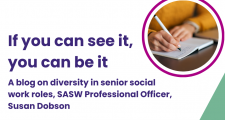If you can see it, you can be it

Oprah famously tells of her experience, as a 10 year old child, seeing Diana Ross and the Supremes on the Ed Sullivan Show. Until that point members of the black community were largely absent in the media, or portrayed using unfavourable racial stereotypes. For the first time Oprah saw a beautiful, talented, black woman being taken seriously and she speaks of the hope it engendered in her. She could see, if not a pathway, the possibility of being able to use her talents and have those talents recognised.
So, what does that have to do with social work I hear you ask.
As social workers, we know that representation matters. Having role models who have overcome adversity to become engaged, productive members of a community provides encouragement and instils hope in others who may be struggling to find their way. Indeed, many social workers themselves are drawn into the profession having overcome significant obstacles and barriers in their own lives, such experience informs and underpins practice that is empowering, respectful and imbued with the possibilities of change, because they have been there and know change is possible.
they simply aren’t there, or at least I certainly haven't seen them.
For social workers from BME communities however, it can be difficult to see people of colour being represented in management and leadership roles within the profession, because they simply aren’t there, or at least I certainly haven't seen them. While there is an increasing degree of diversity within the frontline workforce, this isn’t reflected in career progression. During my time with one of the most diverse local authorities in Scotland there was not one Service Manager, Head of Service or Senior Leader from a visible minority ethnic community. It may be that the strongest, most talented social workers in that authority area happened to be white, mostly male, but I would question that being the case. A picture of homogenous senior management teams is replicated across social work throughout Scotland.
Representation of people with visible difference matters. Diversity can bring balance and constructive professional challenge around organisational norms, provides avenues for people of all ethnic and racial backgrounds to progress and succeed in a profession where racism continues to be problematic. More than that, every person in social work has the right to develop and progress their career in a way that is meaningful to them. Research shows increased barriers to people with BME backgrounds pursuing career progression in social work and social care, particularly for women.
We need to think about how we develop leadership within social work, the people we mentor and support, the voices we are prepared to hear in operational and strategic discussions. We need to, be aware of the unconscious bias we all carry thatl too often gives more weight to people who look, think and sound like we do. We also need data, to understand how many social workers do rise through the ranks into senior leadership and where blocks and barriers might exist.
How fine it would be for a social worker from a BME background to have their “Oprah moment” inspired to achieve through seeing the achievements of those who have gone before.